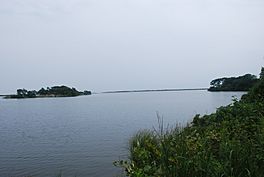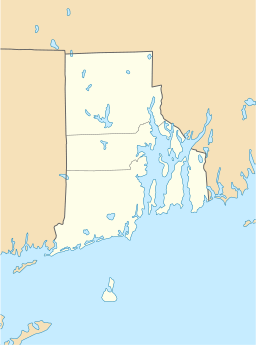Trustom Pond facts for kids
Quick facts for kids Trustom Pond |
|
|---|---|
 |
|
| Location | South Kingstown Washington County, Rhode Island |
| Coordinates | 41°22′17″N 71°34′57″W / 41.3714905°N 71.5825599°W |
| Type | saline |
| Primary inflows | precipitation, groundwater |
| Catchment area | 794 acres (321 ha) |
| Basin countries | United States |
| Surface area | 180 acres (73 ha) |
| Average depth | 1.3 ft (0.40 m) |
| Surface elevation | 0 ft (0 m) |
Trustom Pond is a special body of water in South Kingstown, Rhode Island. It is a closed lagoon, which means it's a shallow area of saltwater separated from the ocean by a narrow strip of land. Locals often call these areas "salt ponds."
Trustom Pond is one of nine such coastal lagoons found in southern Rhode Island. It covers about 800 acres, which is roughly the size of 600 football fields! It's also unique because it's the only salt pond in the state that hasn't been developed by people. The pond is quite shallow, averaging about 1.3 feet deep. Its water is a bit salty, with a salinity level of 5 parts per thousand. This means for every thousand parts of water, 5 parts are salt.
Normally, Trustom Pond does not have tides like the ocean. However, during big storms, the ocean can break through the land barrier, causing the pond's water levels to change. The pond gets its water mostly from rain and water that seeps up from the ground. No streams flow directly into Trustom Pond.
Contents
Trustom Pond National Wildlife Refuge
Trustom Pond National Wildlife Refuge is a protected area around the pond. It's a safe home for many different animals. People love to visit this refuge, especially for bird-watching.
Amazing Wildlife at the Refuge
The refuge is home to an estimated 300 different kinds of birds. You might also spot about 40 types of mammals, like deer or foxes. Plus, there are around 20 types of reptiles and amphibians, such as turtles and frogs. One special bird that lives here is the piping plover, which is a small shorebird.
How the Refuge Grew
The Trustom Pond National Wildlife Refuge started in 1974. At that time, 365 acres of land were given to the U.S. Fish and Wildlife Service. Over the years, more land was donated or bought. Now, the protected area covers about 787 acres. In 2010, around 70,000 people visited this beautiful wildlife refuge.
Exploring the Nature Trails
The refuge has about 3 miles of nature trails for visitors to explore. These trails take you through different types of habitats. You'll see open fields, areas with shrubs, thick woodlands, and both freshwater and saltwater ponds. There are also sandy beaches and sand dunes along the coast.
Helping Wildlife Thrive
Wildlife managers at the refuge work hard to keep the habitats healthy. Sometimes, they create openings, called "breachways," to connect the pond to the Block Island Sound. This helps to lower the water levels in the pond. When the water goes down, it creates muddy areas called mudflats. These mudflats are perfect feeding spots for waders, which are birds with long legs that walk through shallow water to find food.


